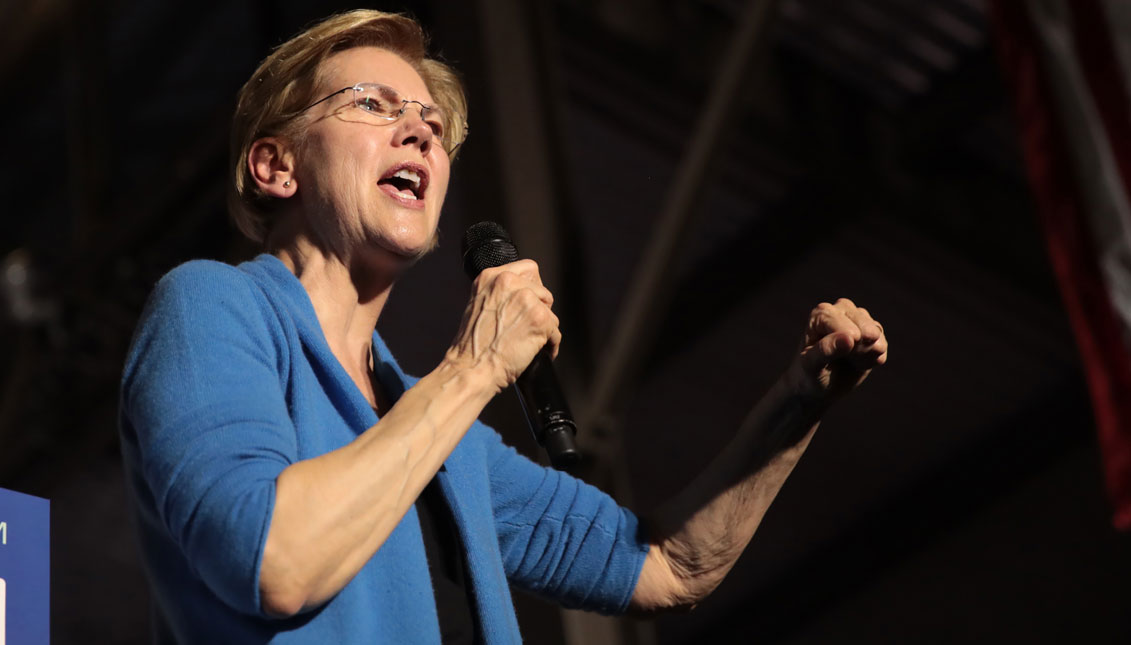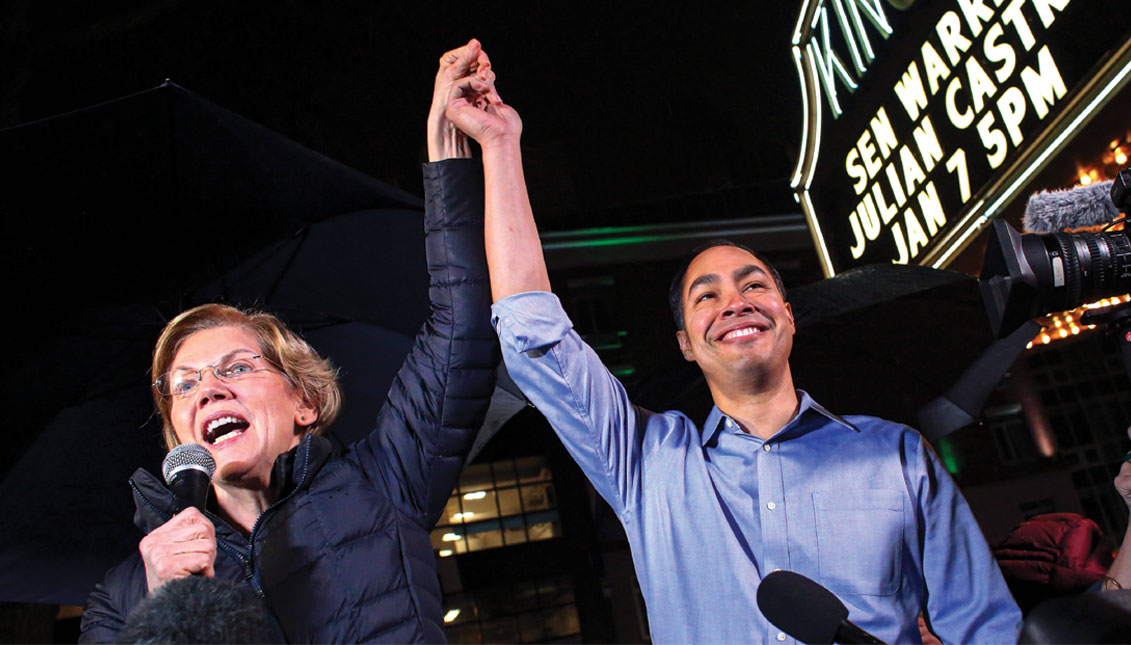
How the country was not prepared for structural change
How the real enemy of the Warren Campaign was gender politics.
A Democratic Primary that began with the most diverse candidate pool in history has been reduced once again to a potential male and white nominee who seems to represent the interests of the system rather than the electorate.
Of all the end-of-campaign announcements, one of the most talked-about and felt nationally was that of Massachusetts Senator Elizabeth Warren, the candidate who not only made it to the end with her head held high, but who came with a real "plan for everything" under her belt.
It is fitting that during this Women's Month we dedicate a few pages to the candidate's campaign and what her withdrawal means for our community.
Not surprisingly, after the failure of the Clinton campaign in 2016, and in the face of a candidate who stands for misogyny like Donald Trump, the Democratic primaries were filled with women convinced that they were a reasonable choice for the Democratic Party in the 2020 election.
By September 2018, Elizabeth Warren announced her intentions to run in the Democratic primary with the establishment of an exploratory committee; five months later, her candidacy was a fact.
Under the banner of unifying the party in progressive approaches, Warren promised a struggle "for great structural change" in the country, which included reversing the power structure and putting the people first.
"It will not be enough to undo the terrible acts of this administration," she said in announcing her candidacy. "We cannot afford to pay a little: a tax credit here, a regulation there. Our fight is for a great structural change. Our fight is for a major structural change. This is the fight of our lives, the fight to build an America where dreams are possible, an America that works for everyone.”
From that moment on, the national media called her "the conservatives' favorite target," warning that her profile might be more "divisive" than really encouraging to the Democratic bench.
Previous setbacks such as the issue with her Native American ancestry, as well as her liberal agenda, made her an unlikely candidate from the start. But nevertheless, she persisted.

Once in the race, and competing with heavyweights at both ends of the political spectrum such as Vermont Senator Bernie Sanders or former Vice President Joe Biden, Warren's campaign became strong because of its appeal in young communities of color, and among the bulk of educated people in the country.
While Bernie Sanders' positions –grassroots politics, free education, and health care, for example– were similar to Warren's, it seemed that only one factor prevented her from breaking through the barrier: being a woman.
By August 2019, Warren was standing strong between Sanders and Biden in the polls, standing out for her simple, direct and inspiring speech, advocating a liberal agenda and far outpacing her opponents in the national debates.
Infrastructure, trade, taxes and the transformation of the economy towards sustainable energy mechanisms were part of her coherent plan to solve the lack of jobs, economic and social disparity and, at the same time, help fight climate change.
However, the last months of her campaign were obstructed by the aggressive phenomenon of gender politics in the country.
After the Super Tuesday elections, her supporters dropped their arms and announced the inevitable: Warren had to withdraw.
"Warren has had a consistent gender imbalance when it comes to male and female voters," Ella Nilsen wrote in her analysis for Vox. "While she typically performs well among women (both in her home state and nationally), men present much more of a challenge. That was true on Super Tuesday as well.”
It didn't help that she had raised a record $100 million in individual donations, turned down corporate money, had –literally– a plan for everything, and took the podiums in every debate. Warren was still falling short of the expectations of a system that still believes that the only way to beat Donald Trump is to play his own game.
"Her victory wouldn’t be a victory for “women,” but a victory that affirmed a woman could succeed without being anything but her specific self," wrote Ana Marie Cox, host of the "With Friends Like These" podcast, in her column for The Atlantic.
By mid-March, the Democratic primary picture was even sadder: Joe Biden was advancing enough in delegate numbers to anticipate that he would eventually be the party's nominee.
With a coalition of support from former candidates and much of the Democratic system, the former vice president seems increasingly comfortable in the lead, leaving behind an exhausted Sanders and half the country, again, without representation.
Ever since former Housing Secretary Julian Castro rolled up his sleeves and got behind the Warren campaign, the country's minorities – women and Hispanics, especially– were waiting for one of the progressive candidates to finally bring his/her political projects to fruition to include us all.
While Sanders had an Alexandria Ocasio-Cortez at his big campaign rallies, and while Biden was struggling to get answers from Hispanic community leaders during the primaries, Warren was publishing a detailed blueprint for Latinos in the country.
RELATED CONTENT
“From Tejano ranchers losing their land in the Southwest to students punished for speaking Spanish in school to toxic dumping in Puerto Rico, the United States has a long-history of government-sanctioned injustices against Latinos,” her project read. “Yet, at every turn in our nation’s history, Latinos, Latinas, and Latinx people have been at the forefront of the fight for social, racial and economic justice -- leading with bold, unwavering courage and unshakable hope.”
A Pre-K12 education plan, a debt relief plan for Puerto Rico, reshaping the immigration system, ending mass incarceration, climate justice, and even closing the wage gap between Latinas and the rest of the country, Warren, again, had a plan for everything.
But the country, and the system, seemed not ready for real structural change.

The results of key votes like Super Tuesday showed that a large part of the young Latino vote in the country is leaning towards progressive proposals like those of Senator Sanders, who won states like California with 49% of the support of the Hispanic community.
This has been a sustained trend since the early states of Iowa and Nevada, where the Senator from Vermont showed strong support in the Latino community.
Chuck Rocha, one of the Sanders campaign's top advisors, told NBC on Tuesday Sanders proved that “if you invest in the Latino community, they will show up and vote for you in huge margins.”
This seems to be because the campaign's strategy has been to focus on voters who register without party preference, who very often are also Latinos.
For his part, former Vice President Joe Biden has had the support of the African-American community across the country but has not offered a solid project for Latinos.
For Albert Morales, political director of Latino Decisions, "Biden will have to do a better job" in attracting Hispanic voters, especially if he wants to win over states like Florida and the Puerto Rican vote on the mainland.
“This 2020 election primary cycle will forever be known as the one where the presumptive Democratic nominee didn't need Latino voters to propel him to the nomination,” wrote Julio Ricardo Varela, a Puerto Rican rights activist and founder of Latino Rebels, on Twitter. “I find that fascinating and am thinking a lot about that.”
“Biden rode the support of Black voters, white suburban voters, and older voters,” he added. “The data will (show) that he did not win over Latino voters, especially younger ones, in the primary. In the end, he didn't need them. Think about that.”
The sad paradox is that, unlike 2016, this year Latinos are paying much more attention to politics, according to the Pew Research Center, which said in a recent report that: "among registered Latino voters, nearly nine out of ten Democrats and Democratic-leaning voters (87%) say it really matters who wins the White House.”
Yet, again, it seems that no one is really paying attention to us.










LEAVE A COMMENT: